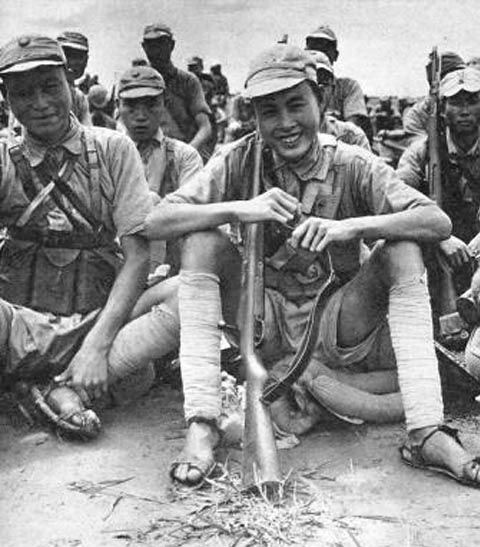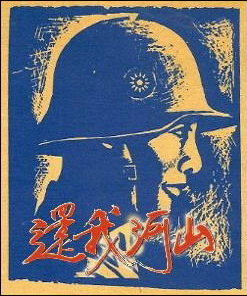Giving Up the Pen For the Sword I
- By Guest blogger
- 31 December, 2014
- No Comments
 Yang Cenfeng was just a teenager when full-scale war broke out between China and Japan in 1937 and his life changed forever. Today he is one of the only remaining veterans in the northern Chinese municipality of Tianjin, and despite his advanced age, he remembers his dramatic wartime past with great clarity. His remarkable story has just been featured in an article on the website of the Tianjin government, and we bring it to you in an English translation provided by the excellent Justrecently’s Weblog. Sentences in italics are the translator’s commentaries. This is the first part in a two-part series.
Yang Cenfeng was just a teenager when full-scale war broke out between China and Japan in 1937 and his life changed forever. Today he is one of the only remaining veterans in the northern Chinese municipality of Tianjin, and despite his advanced age, he remembers his dramatic wartime past with great clarity. His remarkable story has just been featured in an article on the website of the Tianjin government, and we bring it to you in an English translation provided by the excellent Justrecently’s Weblog. Sentences in italics are the translator’s commentaries. This is the first part in a two-part series.
He was fifteen at the time of the Nanjing massacre, and witnessed the panic and helplessness of the refugees who had escaped from there, and the bloody images of Japanese soldiers hunting the common people of Nanjing. He gave up the pen for the sword, and as a member of the Whampoa / Huangpu Branch Seventeen, joined the Chinese Expeditionary Force and fought in the battle of Taungoo, the fiercest in the defense war of Myanmar, he’s the only Tianjiner still living and in good health who was part of the Chinese Expeditionary Force – the War of resistance against Japan veteran Yang Cenfeng. On December 13, 2014, the first day of commemoration (of the Nanjing massacre) held in China, 93-year-old Yang Cenfeng told us this dark period in history 77 years ago, which no Chinese people can ever forget.
Seventy-seven years ago, Yang Cenfeng was in senior high school and living in a family of seven, in Wuhu, next to the Yangtze River. This was a gateway to Nanjing, with only some ninety kilometers between there and Nanjing. After the Japanese had occupied Nanjing, the burning, killing and looting started, and some lucky Nanjingers fled in panic to Wuhu, which, although peaceful, saw the Japanese soldiers coming nearer with each passing day.
At the time, everyone had heard about the disaster of Nanjing, and hated and feared the Japanese. And in fear, the people of Wuhu spent the Spring Festival days of 1938.
“I remember the day of Spring Festival, we were just having a somewhat gloomy family reunion dinner. Just when the meal came onto the table, the air-raid sirens went off, and Japanese airplanes passed through, dropping bombs. At the time, the planes flew at particularly low heights, and I could clearly see the Japanese flag underneath the wings. They bombed unscrupulously, strafing here and there, and whereever they went, they left ruins, and seas of fire”, Yang Cenfeng said.
When the Japanese army approached Wuhu, many common people of Wuhu also fled into all directions, placing their hopes on the New Fourth Army on the northern side of the Yangtze River.
Yang Cenfeng’s recollections continue with a description of how people fleeing Wuhu and waiting for the ferry to the northern banks of the Yangtze – the place densely crowded – were bombed by Japanese warplanes, with countless numbers of people dying on the riverside, or dying in the river. How many people actually died, Yang Cenfeng doesn’t know, but he remembers how the water of the river turned red from the blood, from people who had come there to seek survival.
Yang Cenfeng’s family leapt from death back into life, finding survival in a small village in Jiangbei [here, geographically and literally: north of the Yangze River] under the protection of the New Fourth Army. At the time, a political instructor named Huang left an unforgettable impression on Yang Cenfeng.
“He put us into groups of, say, forty to fifty students, he told us that ‘young students should protect and defend China’, put us into a few groups so that we would stand guard, and taught us many songs to boost our morale.
Instructor Huang’s lessons turned Yang Cenfeng to the idea of giving up the pen for the sword, and after a stay of four or five months in the village, he enrolled at the Huangpu Military Academy’s Southern Anhui branch. Together with fourteen classmates, all eye witnesses of the Japanese invaders’ atrocities, walked more than 150 kilometers in four days, and reached the administrative office in Tunxi in southern Anhui, and joined the army to join the resistance against Japan.
“My family wouldn’t let me go, so I secretly took three silver dollars from home and went to Tunxi with my classmates.”
But an application for [entrance] exams required graduation from senior high school. Lacking qualification, Yang Cenfeng and his classmates, with their own determination and willpower to resist Japan, impressed the school and were finally admitted to the exams. Going through layers of selection with subjects of literature, math, English, politics etc., Yang Cenfeng and ten of the classmates who had traveled with him entered Huangpu Military Academy.
Having become a student of the Huangpu Branch Seventeen, and because of the Japanese closing in, southern Anhui became into imminent danger, and to protect the young seed of resistance against Japan and national salvation, the Branch Seventeen had to be transferred to Chengdu in Sichuan. After a four-months walk, Yang Cenfeng and his classmates arrived in Chengdu, and began their life of learning there.
(To be continued)



 Copyright © 2024
Copyright © 2024
Leave a Reply